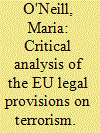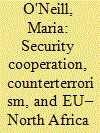| Srl | Item |
| 1 |
ID:
080877


|
|
|
|
|
| Publication |
2008.
|
| Summary/Abstract |
Terrorism activities within the EU are essentially transnational. Given that counter-terrorism operations and prosecutions have been allocated to different actors in different EU member states, operating within quite differing legal provisions and systems, co-ordination by the EU in this area is to be welcomed. In addition to critically examining the new EU laws in this area, this paper focuses on legal framework for the interaction of police, security services, and judiciary across Europe in this task, to include Europol and Schengen provisions. It also pays particular attention to the divergent positions of the UK and Ireland within this framework.
|
|
|
|
|
|
|
|
|
|
|
|
|
|
|
|
| 2 |
ID:
138871


|
|
|
|
|
| Summary/Abstract |
The EU is clearly in the process of developing an external dimension to the Area of Freedom, Security and Justice (AFSJ). This paper focuses on ex. Police and Judicial Cooperation in Criminal Matters (PJCCM) provisions. These developments pose specific legal basis issues for the EU, given its complex EU–member state legal relationship, and the inter-institutional balance, all reflected in the treaty framework post-Lisbon. New Court of Justice rulings are now emerging which will assist in this issue. Equally the approach to be taken in developing these relationships will be crucial. This paper proposes the adoption of an Onuf style constructivism in order to best capture the reality of the process that is developing, and has developed for the ex. PJCCM measures internally. This then needs to be allied with a constitutionalism model to ensure a balanced development of all three aspects of the AFSJ.
|
|
|
|
|
|
|
|
|
|
|
|
|
|
|
|